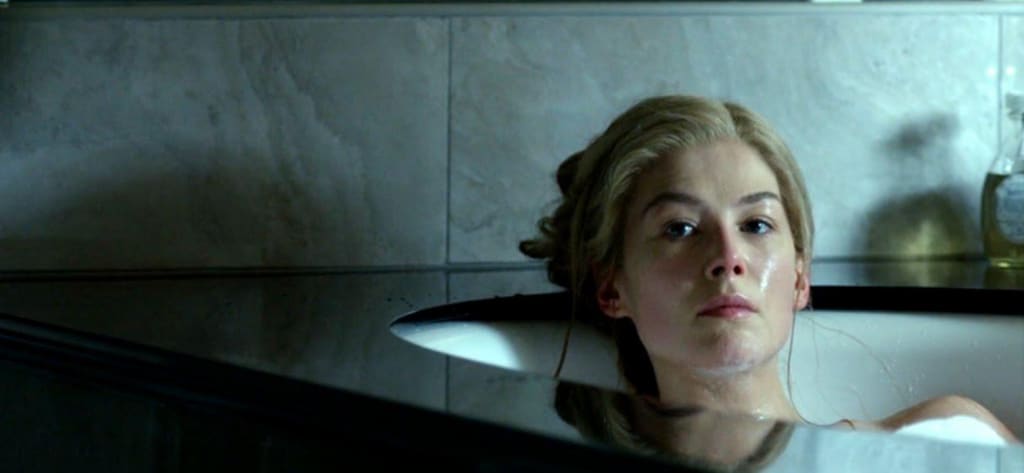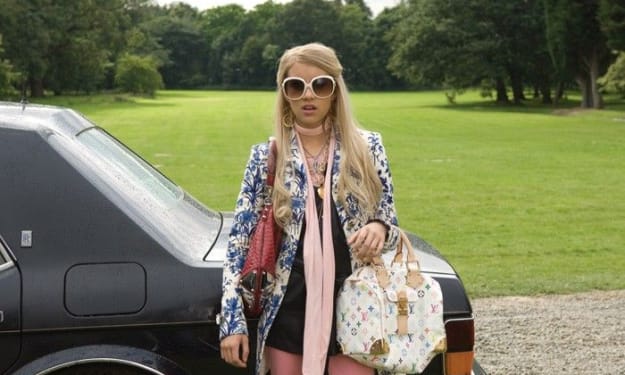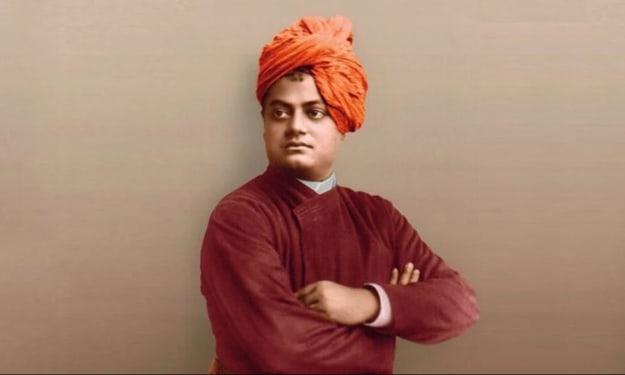The Gone Girl Revival
Cool girl is hot. Cool girl is game. Cool girl is fun.

Spoiler warning!
Gone Girl, both the book and the movie, have seen a resurgence in the past six months or so. Snippets of the 'Cool Girl Monologue' have been floating around Tiktok, and aesthetic images of Amy Dunne are appearing on Instagram, with captions claiming 'she did nothing wrong'. Of course, with lockdown it was inevitable that many movies would find many new viewers, particularly films that were very popular when they first came out, but there has been a certain added attraction to movies with highly gender-based commentaries: American Psycho, Fight Club, and Gone Girl, to name a few. The reasons for this Gone Girl resurgence in particular are a complex tale of anger, counter-movement and irony.
Tiktok and its role in feminist debate
Tiktok is obviously not the best platform for nuanced discussions about feminism, due to its short video style and viewer's tendency to criticise people over points of view. However, debate takes place here nonetheless, as Tiktok does have its' merits for its' ability to spread information and get videos to interested individuals. All this results in unpolished ideas surrounding feminism spreading like wildfire.
One of the most popular points of discussion in this niche corner of Tiktok is the criticism of choice feminism (or other, similar genres of feminism: neo-liberal feminism, girlboss feminism, buzzfeed feminism, white feminism- you get the idea). Despite it being the most mainstream type of feminism, it is widely criticised- and for good reason (this article gives a good rundown of the negatives of choice feminism)- so it's no wonder that this criticism found it's place on Tiktok.
The third ingredient in this perfect storm is the viewers of this content. Often teenagers, often slightly rebellious, often looking for new points of view to explore, and- a point that is too often overlooked- they genuinely care for social justice and changing the world around them.
Overall, the combination of Tiktok's drawbacks as a platform, the widespread criticism of choice feminism, and the viewer base, all results in the movement against choice feminism becoming a tangled heap of mockery, satire and layered in-jokes, in a fight to become the most feminist. Or, in a more pessimistic sense, the most critical, as many incorrectly conflate criticism of girlboss feminism as automatically being peak leftist feminism.
Satirical (or not so satirical) misandry
It is natural and warranted for a woman to feel anger at the patriarchal oppression she has faced, therefore it was to be expected that the people in this anti-choice feminism circle have viewpoints fuelled by anger and personal experience. This anger compounds with everything mentioned above to produce many, many anti-man jokes- most notable being KAM (kill all men). In this niche circle of Tiktok, which has found a mirrored niche on Instagram, this form of satirical commentary manifests itself in the idolisation of Amy Dunne. Hence, the Gone Girl Revival began.
Idolisation of characters like Amy Dunne range from genuine analysis of the movies and their commentaries on society, to aesthetic images paired with coronating them as 'girlbosses', in an attempt to reclaim the concept of the girlboss in mockery. On the more academic end of this spectrum lies the analysis, that often brings insights into how these characters portray the double standards of society- with Amy Dunne bringing up valid points about the perception of women in the modern day, most notably in her infamous Cool Girl monologue, or Love Quinn from 'You' showing how Joe can dish out what he can't take, and expects the woman in his life to adhere to his initial fantasy.
This sarcastic misandry comes into play when the idolisation is focused less on what the characters stand for, and more on the pain and revenge they inflict onto the men in their lives. In the case of Amy, the concept that the revenge she inflicts on Nick is symbolic of fighting back against the male population's misogynistic expectations of women is completely missed. Instead she is individually deified as a champion of this subsection of feminists, despite the fact that she carries a lot of internalised misogyny towards other women. This individual idolisation, devoid of any ideas of collective mobilisation, comes full circle- back to the idea of the girlboss breaking the glass ceiling, yet instead of achieving individual career goals, she achieves the ultimate individual revenge. Any previous criticisms of individual success not helping all women are not transferred over, as they are hidden under layers of irony and lack of critical thought.
There is a fine line between finding comfort in Amy and idolising her, and by certain corners of Tiktok and Instagram, that line is blurred. Amy can provide a sense of catharsis as she embodies a kind of revenge fantasy, finally releasing the feminine rage we are trained to supress, however idolising her fully does not allow space for her flaws to be explored and criticised, and therefore does not allow for self-reflection when resonating with this character.
How harmful is this idolisation?
Inevitably, misandry makes the feminist movement less palatable to men- but one of the main reasons this subgroup of feminists formed was in reaction to the placidity of mainstream feminism. It was years of supressed hurt at female issues being downplayed in order to make feminism palatable to men that partly drove them away, so making the feminist movement palatable should never be the priority.
Secondly, idolisation of Amy Dunne always has satirical underlayers. None of the teenage girls that hail her as a girlboss on Instagram are at all likely to go ahead and enact a similar plan to Amy. The people who have been pushed into this feminist counterculture are (mostly) highly intelligent and analytical, and use their idolisation of Amy as a subtle mockery of the men who unironically idolise similar male-equivalent characters (notably the Joker, Tyler Durden etc.) and for years have not received a second glance for it. Layers of irony underpin their reclamation of the girlboss, with relation to characters such as Amy.
The only real issue I see with it is that this subgroup has now been far removed from the initial criticisms of choice feminism, particularly with regards to it's lack of intersectionality. Due to the anonymised nature of many posters, particularly on Instagram, it is hard to know what the demographic is. But the women who are most often idolised are straight (or at least attracted to men), white, cisgendered, conventionally attractive and middle class. Amy Dunne, Jennifer Check, Love Quinn and Dani Ardor all fit this. I wonder how far they would be idolised if they did not fit this demographic. I wonder how far the idolisation is aesthetic.
Recreational Feminism
Back when I first started flirting with the idea of writing articles, I had a plan for a kind of 'Recreational Feminism Manifesto'. I saw the way in which people (again, primarily the white, cisgendered, teenage girl) were engaging with feminism. It was not by endlessly reading academic articles on feminism, or by learning the history of the movement, or even engaging in productive conversation. At the best of times it was by posting bite-sized opinions that are too often misinterpreted, and the rest of the time it was by sharing memes. Again hailing back to these layered in-jokes, recreational feminism assumes a level of background knowledge the viewer of these memes has, and allows them to wallow in a kind of pessimistic view on feminism. Instead of mobilising with this go-getter attitude (that at least the girl-boss feminist movement can boast having), the recreational feminist resigns herself to a false acceptance of the current patriarchal reality. She engages in feminism in the most passive way- for entertainment rather than change. The Gone Girl revival certainly fits this category. Jokes to cope with patriarchal oppression, rather than real mobilisation.
I have many more thoughts on the benefits and drawbacks of recreational feminism, which I will likely post soon, so don't take this as a complete dismissal of it's merits.
Overall the Gone Girl Revival exemplifies the inevitable post-girlboss era. It serves both as an angry reaction to endless suppression in favour of palatability to men, and also a self-indulgent revenge fantasy. The satisfaction in understanding the joke under countless layers of irony keeps engagement with the movement high, yet the irony also shields these jokes from any criticism- namely that they have forgotten their roots as a counterculture to another movement that lacked intersectionality. This revival teeters between genuinely funny, self-aware, feminist takes, and ideals that are no better than the movement they initially criticised.
About the Creator
Hannah Macdermott
the rantings and ramblings of an inconstant mind.







Comments
There are no comments for this story
Be the first to respond and start the conversation.